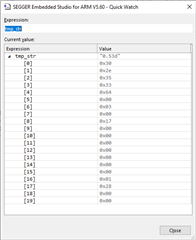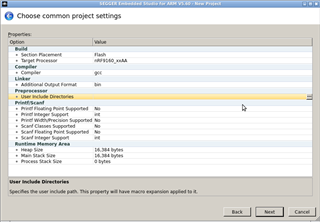Hi,
I am doing a simple thing with string formatting:
sprintf(tmp_str,"%d.%d.%3d", version.major, version.minor, version.patch);
The version structure has values { 0, 5, 1 } and char tmp_str[20]. I want to achieve string like "0.5.001". Instead of getting this format, I am getting "0.5.d".
For a curiosity I tried to change the format to "%3d.%d.%d" and I got "d.0.5". Format "%d.%d.%d" works as expected - 0.5.1.
I am using SDK 17.0.2 and SES 5.60.
Can somebody advise me how to brush sprintf to work as expected? I am not asking for workarounds how to get the expected string format rather to get sprintf working.
Thanx.
Best regards,
peter




